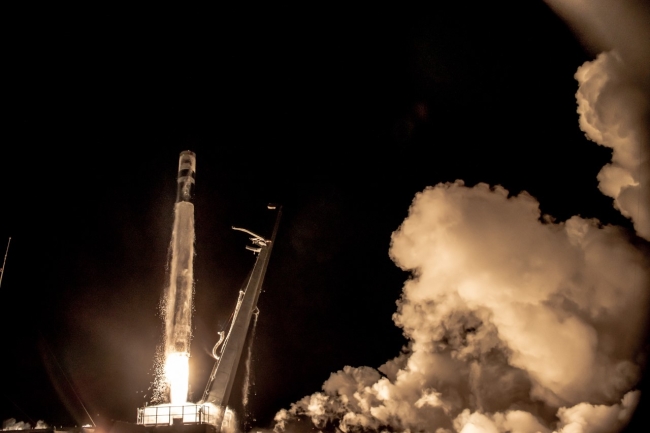| (July 29, 2021, 5:15 a.m.) -- Long Beach headquartered Rocket Lab has successfully launched a research/development satellite into orbit for the U.S., Space Force (USSF) from the firm's New Zealand launch facility.
The launch, using one of Rocket Lab's Electron rockets, sent an Air Force Research Laboratory-sponsored demonstration satellite into low Earth orbit at 11 p.m. Pacific time July 28 from the firm's launch facility on New Zealand's Mahia peninsula. It's Rocket Lab's second mission conducted for USSF. It's the firm's first mission since suffering a failure on May 15 in which Electron's second stage shut down prematurely resulting in loss of the mission's payload (two satellites for the geospatial intelligence company BlackSky Global.) A company release says the satellite (named Monolith) "will demonstrate the use of a deployable sensor, where the sensor’s mass is a substantial fraction of the total mass of the spacecraft, changing the spacecraft’s dynamic properties and testing ability to maintain spacecraft attitude control. Analysis from the use of a deployable sensor aims to enable the use of smaller satellite buses when building future deployable sensors such as weather satellites, thereby reducing the cost, complexity, and development timelines." [Rocket Lab release text] The mission was procured by the Department of Defense (DoD) Space Test Program (STP) and the Rocket Systems Launch Program (RSLP), both based at Kirkland Air Force Base, New Mexico.; in partnership with the Defense Innovation Unit (DIU) as part of the Rapid Agile Launch Initiative (RALI). The mission is being managed by the Launch Enterprise’s Small Launch and Targets Division, which is part of the USSF’s launch organization of choice. The mission has been named ‘It’s a Little Chile Up Here’ in a nod to the beloved green Chile of New Mexico where the Space Test Program is based. [Scroll down for further.] |
     |
 Photo courtesy Rocket Lab
Photo courtesy Rocket Lab








